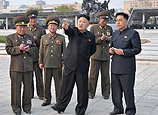
The U.S. is the only country that opposes to establishing international rules on cyberspace. In 2011, China, Russia among other countries jointly submitted the International Code of Conduct for Information Security to the United Nations with the purpose of preventing cyber arms race and cyber warfare as well as promoting the cyber security and peace. This proposal is hailed by the international community. Only the U.S. forcefully opposed to and obstructed it.
At the same time that the U.S. hypes up China’s cyber threat, it quickens its pace in cyber army expansion. Although it has sharply reduced its military expenditure, it plans to increase its Cyber Command staffing by five times. In 2014, the U.S. expenditure in cyber security will increase to 17.7 billion U.S. dollars. In March 2013, the NATO issued Tallinn Manual on International Law Applicable to Cyber Warfare. Although it is not the official document of the NATO, its points of view are exactly the same with that of the U.S. Department of State. It is obvious that this manual aims to put a legitimate cover on U.S. cyber warfare.
In the context of globalization and informatization, the Internet has great influence in every aspect of our life. China firmly opposes to any kind of cyber attacks. Developing a peaceful, safe, open and cooperative cyber space is in line with the common interests of China, the U.S. and other countries. The groundless accusations and hype can only do harm to the efforts of dialogues between China and the U.S.
Cyber arms are more horrible than nuclear weapons. Once cyber warfare is triggered there will never be peaceful days. It is a dangerous move to try to obtain cyber military supremacy by bringing shame on other countries, which will definitely result in shooting itself in the foot.
Read the Chinese version: 抹黑中国难掩“黑客帝国”恶行, source: People's Daily, author: Zhong Sheng
 |


















![]()
